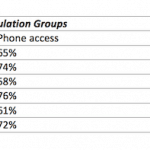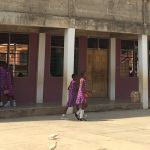Getting Children Back to School: Lessons Learned from Uganda as it Ends the World’s Longest COVID-19 Shutdown
On January 10, Uganda reopened schools across the country — ending the world’s longest COVID-19 shutdown. Students in Uganda have been out of the classroom since March 2020, and while some schools attempted virtual education, limited digital access means that the majority of young people have not been learning for nearly two years.
The impact of these extensive closures will be dire. In addition to the learning loss that has already occurred, officials estimate that roughly a third of students won’t ever return to school, largely because of early marriages, teen pregnancies and child labor. As Ugandan education researcher Mary Goretti Nakabugo noted in a New York Times article about the shutdown, “The damage is extremely big…we may have lost a generation.”
Schools can reopen — but will they?
Jude Nsumba runs the Good Shephard school in Uganda. Prior to the pandemic, he was an active participant in Opportunity International’s Education Quality (EduQuality) program, an initiative designed to provide parents with financial support to cover school fees, help educators improve their facilities and programs, and enable teachers to learn from one another. As part of the program, Nsumba was learning how to improve his students’ academic achievement. But when COVID-19 hit Uganda, he knew he had to adapt to protect his students — and keep his school afloat. As a low-cost private school meeting an essential gap in the education market, the Good Shephard school operated as a business. And with all of his students at home, Nsumba immediately lost all of his revenue. For schools like his, the economic risks of a prolonged shutdown were enormous.
In response, with guidance from Opportunity’s Pathways to Reopening plan, Nsumba brought together parents and teachers to brainstorm solutions. Together, they decided to plant vegetable gardens on the school grounds. They set up a market stall to sell the produce, eventually generating a sustainable income to support ongoing school costs. Though these funds didn’t match the school’s previous revenue, they were enough to maintain the building and cover some of Nsumba’s personal expenses so that he didn’t need to close the business and find another job.
Thanks to their innovative problem solving, the school survived. But countless others were not so lucky.
Without government support, affordable private schools like Nsumba’s – which rely on low-cost school fees to cover operational costs, including teacher salaries, rent for buildings and loan repayments – have been at great risk of closing permanently. Last August, Uganda’s National Planning Authority estimated that about 3,507 primary and 832 secondary schools were unlikely to survive the shutdown.
Already, “Kampala’s suburbs are littered with ghost structures that were once schools,” The Guardian reported. “Some buildings were sold, while others have been destroyed to make way for real estate development. Kampala Capital City Authority said that more than 40 schools in the city have closed for good.”
The impact these closures could have on students is massive. Worldwide, about 400 million children rely on private schools for their educations. And we know that education is central to children’s future success: The longer they stay in school, the greater their earning potential, health and opportunities.
The particular risks of school closures for girls
Permanent school closures are making convenient, affordable education even more difficult to access in Uganda. But even lengthy temporary school shutdowns have caused students’ lives to dramatically change over the past two years. And this is especially true for girls.
Girls have always faced additional social and cultural hurdles when it comes to education, but in the context of the pandemic, these challenges have multiplied. If a girl cannot go to school due to long-term or permanent closures, she is at even greater risk of getting pregnant, getting married young or staying at home to help her family.
Between March and September 2020, pregnancies among girls in Uganda aged 10-14 increased by 366.5%. “Given that teenage pregnancies and early marriages are significant correlates of school dropout,” the Ugandan National Planning Authority noted, “it suffices to project that many girls will not return to school after reopening.”
The social stigma and practical realities of pregnancy make it incredibly challenging for young mothers to return to the classroom. In addition, Brookings reported that “for many girls, COVID-19’s associated economic crises exacerbated gender inequalities that are more acute among older adolescents – from increased limitations on their freedom of movement to the need to care for younger siblings and perform household chores to the likelihood of being married off to relieve pressure on sparse household resources.”
In light of these issues, for girls especially, we need as many education options as possible so that they can stay in school, continue learning, and delay pregnancy and marriage.
How to successfully reopen schools
Now that schools in Uganda are able to operate in person, the two big questions at hand are simple:
- How do we help as many schools as possible to reopen?
- How do we help as many students as possible to get back into the classroom?
Thankfully, the country is not addressing these challenges in a vacuum. In 2014, schools in West Africa faced these exact hurdles in the wake of the Ebola outbreak. The lessons they learned provide a helpful roadmap for education in Uganda — and around the world — in the aftermath of COVID-19. These lessons include the following three key learnings:
- Families need to know that school is a safe and healthy place to be: Assuring families that school is indeed safe — and equipping schools to maintain the highest standards for hygiene — is essential for reopening. Opportunity International has been at the forefront of these initiatives, providing guidance to schools on how to set up hand-washing facilities and proper cleaning practices to keep students as healthy as possible.
- Targeted communications are essential: Families need to know that schools are open again, and that it is safe to return. These key messages are especially important for the students who are least likely to return, including children in remote, rural communities, pregnant girls and students who have become key economic drivers in their families. In Sierra Leone after the Ebola pandemic, for example, effective communication led 14,500 pregnant girls and young mothers to join a bridge education program designed to allow them to continue learning – though the program had initially planned to register only 3,000.
- Students must be able to afford the return to school: In addition to reduced incomes and financial pressure caused by the pandemic, many families have been relying on their children to handle key household responsibilities and income-generating activities over the past two years. Combined, these two factors make the return to school a largely economic decision. In addressing this issue, partners like Opportunity International can play a key role — both by helping parents earn and save their own sustainable incomes through targeted financial services, and by working with our financial institution partners to offer specialized loans to cover school fees.
For school proprietors like Jude Nsumba, reopening is just the beginning. For two years, he has connected with his fellow educators via WhatsApp, delivered workbooks to students, shared resources to stay afloat, and received constant support from Opportunity International and other partners. He has done whatever he needed to do to sustain his business and continue serving his students – and he has succeeded. The losses faced by schools like Nsumba’s across Uganda have been — and will continue to be — massive, as will the impact of these schools’ struggles on the country’s youth. But for the first time in two years, he is hopeful for the future.
Atul Tandon is the CEO, and Andrew McCusker is Head of Education Finance at Opportunity International.
Photo courtesy of David Walker.
- Categories
- Coronavirus, Education
- Tags
- COVID-19, gender equality, youth





